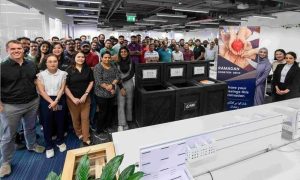Opinion: The alternative workforce
Louise Rodrigues, PM consultant, Aquila, looks at the perks of hiring freelance talent

The alternative/contingent workforce is a commonly-used practise across the globe today, with around 30% of the existing working population being made up of Freelancers, Consultants, Temps and Contractors. Sources: [1,2,3]
“It’s now mainstream. For years, many considered contract, freelance, and gig employment to be ‘alternative work,’ options supplementary to full-time jobs. Today, this segment of the workforce has grown and gone mainstream even as talent markets have tightened, leading organizations to look strategically at all types of work arrangements in their plans for growth.”
(Deloitte, 2019 Global Human Capital Trends)
The market has grown very competitive; world-wide, companies are looking to reduce overheads, whilst maximising revenue. Now is an interesting time for Freelancers to receive even greater exposure in the UAE Employment market, particularly with forward thinking organisations, who wish to benefit from the flexible operations. The alternative workforce is known to increase business efficiency, agility and flexibility. They also cost less and turn traditionally fixed employment expenses into variable costs.
As is recognised in the construction industry, quantity and type of resource does not stay constant throughout the course of a project – and for this reason, project work naturally lends itself to flexible workforce arrangements, in terms of time and resources. The smart (and leaner) businesses tend to pull in their best people to suit the project stages; to open, deliver, close and operate a project, exactly as required.
Accessing the alternative workforce is a great place to explore top talent, whilst considering business cost parameters. This enables you to resource a project with experienced and skilled personnel, whilst maintaining fluctuating workload levels, throughout the business year. Freelancing offers a flexible alternative to fixed resources, in terms of;
Efficiency
- Teams which grow and reduce, on a needs basis
- Supports lean business models
- No unallocated resources
Expertise
- Critical and specialist skills for particular projects / project stages
- Fast track projects – requiring a team to hit the ground running
- Complex projects – experienced team, with a proven delivery history and those who can re-strategise projects to make them work
Budget certainty
- Pay-As-You-Go approach, so you can plan your project skills to suit the project budget and risk
- Reduction of employment overheads
Time
- Flexible term contracts
- Short mobilisation / demobilisation
Location
- Can bring in skillset from overseas, as required
- Relocation for duration of contract
Long term relations
- Relations are built within the industry, over repeat assignments
- Teams with a proven track record for delivery can hit the ground running on new projects
- Teams who know each other, perform better
“For organisations that want to grow and access critical skills, managing alternative forms of employment has become critical.”
(Deloitte, 2019 Global Human Capital Trends)
It has been reported that HR teams support the idea of sourcing an alternative workforce. However, over a third of HR teams are currently not involved in selecting Freelancers[4]. Thus, a focus on HR recruitment strategies and policies to facilitate the growing number of Freelancers needs exploring, moving forward. Acknowledging that there is a change in employment trends, will give the employers of tomorrow an edge in packaging work in more appealing ways – to attract the best talent.
There are various reports explaining the ‘Gig’ economy and culture to us. It is a difficult demographic to source accurate numbers on, for the reason that there are so many modes of operation (self-employed, part-time, side hustle, online support, etc.). The Gig economy has been reported to be preferred by 75% of Millennials and Gen Z’s, who want to work for themselves in the future (whilst they currently ‘Gig’ in their existing employment). Thus, traditional-minded recruitment and HR teams may need to explore along these strategic avenues for sourcing talent on future projects. Investigating the alternative workforce modes today, helps organisations plan and prepare us all for the future.
Traditional routes of employment and recruitment are already becoming the road less travelled, out of choice – and the high level data seems to speak for itself. Freelancing Professional skills are available on the market across almost every industry right now[5], from Accountancy to Healthcare, from Law to Media.
How is your business planning for future workforce trends? Do you already hire Freelancers? Has it changed the way you are thinking about your organisation’s future?
Sources credited:
The alternative workforce: It’s now mainstream (Deloitte Insights)
2019 Global Human Capital Trends (Deloitte)
Trends in self-employment in the UK (Office of National Statistics, UK)
[1] Harvard Business Review, April 2018, estimates that there are currently 150 million Freelancers in the US and Europe, set to rise
[2] By 2020, 50% of the U.S. workforce will be freelancers (this does not mean they are all full-time freelancers, but one of every two workers will be freelancers in some capacity). (The Rise Of The Freelancer Economy, Brian Rashid, Forbes.com, Jan 2016)
[3] Independent Work: Choice, Necessity, And The Gig Economy, McKinsey Global Institute, October 2016
[4] This Hot Trend Could Make Freelancing A Lot More Fun — And Meaningful (Elaine Pofeldt, Forbes.com)
[5] 15 Important Trends In Freelancing: Why This Matters Now (Jon Younger, Forbes.com)

























